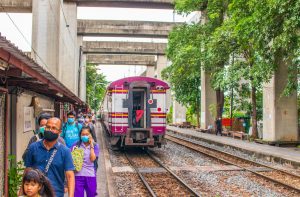On June 16, amid soaring COVID-19 cases, Thailand’s Prime Minister Prayut Chan-o-cha made a bold announcement that he would “fully” reopen the country “in 120 days from today” to boost economic recovery. But with the countdown clock ticking down, it has become clear that Prayut’s vow lacks serious substance. Members of his government have given different answers when questioned about the specific date and procedures towards reopening, and the Thai public has been left confused and frustrated.
In September alone, the public has been overwhelmed by inconsistent information from government agencies. Government spokesperson Thanakorn Wangboonkongchana, in an effort to demonstrate a strong commitment to the prime minister’s 120-day goal, stated in early September that the government had planned to open Bangkok and four other pivotal tourist areas – Chiang Mai, Pattaya, Hua Hin, and Phetchaburi – by October 1. Another 21 provinces were due to open in mid-October. His words were confirmed by the Tourism and Sports Minister Phiphat Ratchakitprakarn. Phiphat, however, later postponed the reopening of Bangkok to October 15 due to insufficient vaccination rates.
Bangkok Governor Asawin Kwanmuang was present when Phiphat made the announcement. Yet less than two days later, Asawin came forward to reject previous deadlines and assert that he has the authority to decide when and how the reopening of the capital will play out. According to the governor, Bangkok will be considered for reopening only if the following conditions are fulfilled. First, at least 70 percent of Bangkok citizens must be fully vaccinated with two doses of approved COVID-19 vaccines. Second, the infection rate must be decreasing. Third, the same must be true for the hospitalization rate. While Asawin did not specify the exact figures for the second and third conditions, he noted that the first condition could be achieved by October 22 or even earlier if more vaccines are allocated to Bangkok.
The Center for COVID-19 Situation Administration (CCSA) consequently pushed the reopening of Bangkok and other concerned provinces to November 1, making Phuket and a few other sandbox destinations in southern Thailand the only areas currently open to vaccinated international tourists. The 14-days mandatory quarantine will be cut in half from October onward, paving the way towards a full opening in December and January next year.
Despite the easing of COVID-19 restrictions and the downward trend of new cases, the Emergency Decree has been extended for another two months. This contradicts the plan – put forward in early September – to employ a more flexible law to replace the strict decree.
These policy flip-flops reflect failures in coordination and communication, as well as the growing infighting within the Prayut administration. Parties involved seem to be more concerned with extracting political mileage for upcoming elections. Tourism and Sports Minister Phiphat, for instance, has been vocal about the reopening of major tourist provinces to alleviate discontent among business owners. As a member of the Bhumjaithai Party, the second biggest party in the ruling coalition that has been blamed for the country’s vaccine mismanagement, Phiphat and other Bhumjaithai members are under extra pressure to tilt the political map in their favor ahead of the next national election, which may take place soon.
Similarly, Bangkok Governor Asawin is hoping to retain his position in the gubernatorial election scheduled for the final quarter of this year. He had previously clashed with the Ministry of Public Health (MOPH) over vaccine distribution in Bangkok. The governor wanted to prioritize high-risk zones whereas the MOPH sought to distribute vaccines equally. The latest poll finds Chadchart Sittipunt, formerly transport minister under the Yingluck Shinawatra government, in the lead but nearly one-third of voters have not made up their minds. Asawin, sensing the public discomfort and risks associated with Bangkok reopening, has therefore decided to play it safe by delaying the reopening.
Meanwhile, Prime Minister Prayut, who has direct command over the CCSA, has remained largely silent on the reopening drama. The Thai leader – now in a vulnerable position following rumors of a plot to oust him and a rift between himself and his longtime allies Gen. Prawit Wongsuwan and Gen. Anupong Paochinda – appears to be prioritizing his own political survival over public needs or policy consistency.
To revive its credibility at home and abroad, and to secure the final chance of the year to kick-start the Thai tourism industry, the Prayut government can no longer afford to postpone the November 1 reopening. Still, given the growing unpredictability of Thai politics, the reopening could very well end up changing again.

































